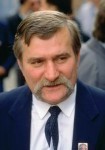 Lech Walesa (1943- ) was a Polish unionist turned politician who played a leading role in resisting communism in his country. Born in central Poland in the midst of World War II, Walesa was the son of a carpenter. The young Walesa moved to the city of Gdansk, where he trained as a mechanic and an electrician. Walesa became interested in workers’ rights and by his late 20s was an influential trade union organiser, participating in and leading several illegal strikes. During the 1970s Walesa combined his union leadership with underground political activism, which earmarked him for surveillance by the Polish Security Service. Between 1976 and 1980 he edited an underground newspaper that attempted to rally workers against the socialist government. Walesa’s opposition to socialism was driven in large part by his Catholic faith and his determination to restore the rights of the Catholic Church.
Lech Walesa (1943- ) was a Polish unionist turned politician who played a leading role in resisting communism in his country. Born in central Poland in the midst of World War II, Walesa was the son of a carpenter. The young Walesa moved to the city of Gdansk, where he trained as a mechanic and an electrician. Walesa became interested in workers’ rights and by his late 20s was an influential trade union organiser, participating in and leading several illegal strikes. During the 1970s Walesa combined his union leadership with underground political activism, which earmarked him for surveillance by the Polish Security Service. Between 1976 and 1980 he edited an underground newspaper that attempted to rally workers against the socialist government. Walesa’s opposition to socialism was driven in large part by his Catholic faith and his determination to restore the rights of the Catholic Church.
In 1980 Walesa participated in another shipyard strike in Gdansk and was elected as its leader. This strike culminated in the formation of Solidarnosc (‘Solidatory’), a confederation of trade unions beyond the control of the Communist Party. By the end of 1980 almost 10 million workers had joined Solidarnosc. The pro-Soviet government negotiated with Solidarnosc at first, however, its patience had expired by the end of 1981. On December 13th the government declared martial law, Walesa was placed under house arrest and Solidarnosc was outlawed. In 1983 Walesa was awarded the Nobel Peace Prize for his non-violent resistance to state oppression. Solidarnosc continued to operate underground during the 1980s, eventually emerging in late 1988 as a de facto political party and winning a majority in the June 1989 national election.
Walesa remained out of politics until 1990, when he agreed to run for the presidency. In December Walesa became Poland’s first democratically elected president, holding office until his defeat in 1995. He stood again for the presidency in 2000 but received only one percent of the vote. Historians have praised Walesa for helping to bring about the demise of Soviet communism in Poland, however, his presidency is seen as a period of partial successes and missed opportunities. Since his retirement, Walesa has courted controversy by making provocative statements about issues such as homosexuality, abortion and Muslim refugees.
Content on this page is © Alpha History 2018-23. This content may not be republished or distributed without permission. For more information please refer to our Terms of Use.
This page was written by Jennifer Llewellyn and Steve Thompson. To reference this page, use the following citation:
J. Llewellyn & S. Thompson, “Lech Walesa”, Alpha History, accessed [today’s date], https://alphahistory.com/coldwar/lech-walesa/.
